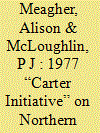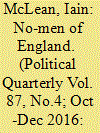| Srl | Item |
| 1 |
ID:
167839


|
|
|
|
|
| Summary/Abstract |
Scholars have extensively documented the vital role of the Clinton administration in the early stages of the Northern Ireland peace process.1 However, Clinton’s intervention in Northern Ireland was not the first by a U.S. president. That came two decades earlier, with the Carter administration. Carter’s brief foray into Northern Ireland politics was obviously more limited than Clinton’s lengthy engagement, and is also less celebrated. This is understandable given the direct role that Clinton, and more particularly his envoy to Northern Ireland, Senator George Mitchell, played in brokering the 1998 Good Friday Agreement (GFA), which underpins the peaceful settlement that the region still enjoys today. But in some ways Carter’s role can be seen as more significant than, or certainly foundational to, Clinton’s efforts. Carter’s intervention came during the Cold War, which had an indirect effect on Northern Ireland.2 Despite significant agitation from Irish America, successive U.S. administrations refused to comment on Northern Ireland, deeming it a purely internal affair—and often a matter of considerable international embarrassment—of the British government, Washington’s key ally in a Cold War context.
|
|
|
|
|
|
|
|
|
|
|
|
|
|
|
|
| 2 |
ID:
149250


|
|
|
|
|
| Summary/Abstract |
Scotland and Wales was a principal policy of the Labour governments in office from 1974 to 1979, it was defeated in a guillotine vote in 1977. That defeat was orchestrated by the leaders of Tyne & Wear County Council, angry that a government of their own party was apparently neglecting their region in favour of Scotland. The project was rescued in two separate bills, but a further rebel amendment inserted a minimum assent condition in the required referendums. The people of Wales rejected the devolution they were offered. The people of Scotland accepted it, but by a margin that failed to cross the threshold. The resulting vote of confidence brought down the Labour government in March 1979. The role of Tyne & Wear County Council in killing the first bill has never been fully acknowledged. The lessons of the story for current devolution policy are explored. If the UK remains a single country, any policy for tax transfers must be fair to the English as well as to the people of the other three territories.
|
|
|
|
|
|
|
|
|
|
|
|
|
|
|
|